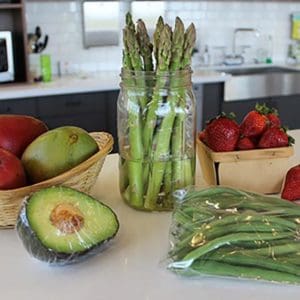Did you know that on average, 40 percent of the food that is purchased in the United States is uneaten, according to the Natural Resources Defense Council? That adds up to a lot of wasted food and money through the course of an entire year. How can you get started reducing food waste? We’re glad you asked.
Below are the top eight tips for wasting less food:
Step Up to Perfectly Pick
Do you know what the best way is to pick a watermelon? How about an artichoke? Knowing how to identify when produce is ripe for the picking is the first step to reducing food waste. No one likes purchasing fresh ingredients only to find that they have already gone bad within a day or two. Well, you’re in luck! We’ve created a host of educational videos that take the guesswork out of picking the perfect fruits and vegetables.
Visit our
Perfect Pickin’ YouTube channel.

Store Foods Smarter
Not all foods are created equal. Some items need to be wrapped up tight, while others are best left au naturale. When foods are stored correctly, they are less likely to go bad as quickly. This means you have a longer period of time to enjoy your food and you won’t feel the guilt of having to throw anything away. By using our foods to their fullest, we are able to reduce food waste and maintain the best quality of our favorite food items. Storing foods the right way can keep you from tossing items too early and will get you a big thanks! from our environment.
Learn some of the smartest ways to store your favorite, natural spring ingredients.
Save It for Later
Did you make too much soup or casserole? Don’t worry! Pour the leftovers in a resealable plastic bag, squeeze out the air, label and date the food, then place in the freezer. That way, you’ll have an ready-made meal that just needs reheating. Better yet, try to designate one dinner night for leftovers. Using all of your leftovers for the week or foods that are about to expire, you can create a dinner smorgasbord. Not only will you cut down on waste, but you’ll also enjoy a variety of food that will give you a break in the kitchen.
Shopping Bulk Foods
Often times we find ourselves buying too much of our favorite granolas or spices and they end up expiring before we can use them all. When shopping bulk, you can scoop as much or as little as you need without having so many leftovers. By using only what you need, you will save money and reduce food waste. After purchasing your favorite bulk items, do the environment even more of a favor by storing these items in re-usable jars or bags.
Plan Your Meals in Advance
How many times during the week do you find yourself asking “What’s for dinner?” For many of us—with our crazy busy schedules—ordering takeout is the option that we go with far too often. One way to avoid this dilemma is to plan your healthy meals ahead of time. Meal planning makes healthier choices easier and it can also help reduce food waste because it encourages you to only purchase the items you need for the week.
Move It to the Front
You just went grocery shopping, now it’s time to unpack. When restocking your pantry, freezer or refrigerator, move older products to the front and newer ones to the back. This will remind you to use the older products first and may even inspire a new “frontline” recipe that you’ve been wanting to try.
Freeze! Shop in the Frozen Foods
Not only do frozen foods often cost less than buying fresh ingredients, they have a much longer shelf life and they can be easily portioned. Just use what you need now and store the rest in the freezer for later! Doing this can greatly reduce spoilage and food waste. Not only that, frozen foods can actually be even more nutritious than choosing fresh!
Make Your Own Vegetable Stock from Cooking Scraps
Save your scraps throughout the week in an airtight sealed container in the fridge or freezer to make a delicious,
homemade vegetable stock. What can you do with vegetable stock? More like, what can’t you do!? Your homemade vegetable stock can be used as a base for soups, stews and stir-fries. You can add it to virtually any vegetarian dish or, when cooking rice, use your vegetable stock instead of water. Is your mouth watering, yet? Reduce food waste by using up these scraps and be sure to
compost any leftover solids!
*Some vegetable scraps are better off going in the composting bin, due to their overpowering flavors. Avoid cruciferous vegetables like cabbage, broccoli, Brussels sprouts, cauliflower and similar leafy green vegetables. Other vegetables to avoid include turnips, asparagus and artichokes.


 VIEW ALL
VIEW ALL



